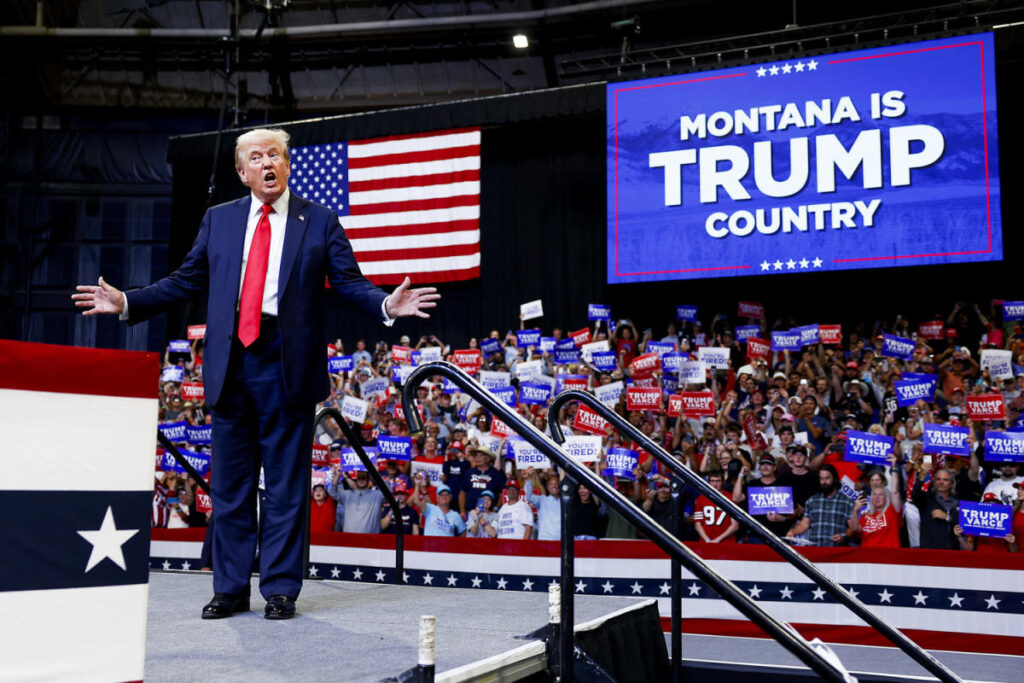The online version of “From the Politics Desk” serves as an evening newsletter, providing readers with the latest insights and analyses from the NBC News Politics team on campaigning, governance, and policy-making in the United States. In this edition, reporters Ryan Nobles and Frank Thorp V focus on the crucial Senate race in Montana and its implications for the Democratic Party’s majority in the Senate. They discuss how Donald Trump’s influence on the electorate could significantly shape the fortunes of Senator Jon Tester, who is fighting for a fourth term in a state that has leaned Republican in recent years. Furthermore, Kristen Welker highlights Barack Obama’s critical message to Black male voters as the election draws near, emphasizing their importance in securing support for Vice President Kamala Harris.
In Montana, Tester is actively courting a dwindling group of “ticket-splitters,” voters who may choose candidates from both parties. Union carpenter Tim Combo, a representative of Tester’s target demographic, expressed his intentions to vote for both Tester and Trump, showcasing the complex voting behavior in this swing state. Despite facing polls that indicate a tightening race against Republican challenger Tim Sheehy, Tester maintains a steady connection with his constituents, leveraging his achievements in securing funding for infrastructure projects. His outreach aims to resonate with voters who might typically back Trump but value Tester’s contributions to their livelihoods, indicating his strategy to appeal to a broad array of constituents despite the increasing polarization in U.S. politics.
The political landscape in Montana is challenging for Tester as he competes in a deep-red state with a Republican base growing ever stronger. Polls suggest he is trailing Sheehy, but interestingly, the margins are tighter than those seen at the top of the ticket, where Vice President Kamala Harris is also contesting against Trump. The dynamic highlights how local issues and personal connections can impact election outcomes even in a polarized environment. Tester’s efforts to demonstrate his independence from national Democratic politics and emphasize his local engagement suggest a calculated approach to galvanizing support among demographics that might otherwise lean Republican.
Additionally, the newsletter explores the Democratic Party’s broader concerns about voter turnout, particularly among Black male voters, with a focus on Obama’s recent rally aimed at empowering this critical demographic. His message underscores the need for solidarity and commitment among Black men to support Harris as they navigate their perceptions of representation and leadership. Polling data reveals a pronounced age and gender gap in political engagement among Black voters, with younger Black men showing greater support for Trump compared to older voters. Obama’s direct call to action highlights the urgency for the Democratic Party in rallying its base ahead of the upcoming election.
The challenges for both Tester in Montana and Harris nationally exemplify the complexities of voter alignment in the current political climate, where alliances are habitually influenced by national narratives and local realities. As candidates sharpen their messaging and outreach efforts, the extent to which they can resonate with diverse voter groups remains pivotal. The outcomes of these races could dictate the balance of power in the Senate and provide significant insight into voter behavior leading into the presidential election, indicating where the Democratic Party’s efforts may need to be refocused in the future.
In summary, the intersections of individual candidate strategies, demographic voting patterns, and national political currents mark this pivotal moment in election season. As political actors navigate these dynamics, the forthcoming weeks will reveal whether Tester’s personal appeal can withstand the broader trend of voter polarization, and whether Obama’s heartfelt appeal to Black male voters will mobilize a critical segment of the electorate. Both scenarios are integral in shaping the outcome of races that could not only alter the Senate’s composition but also set the stage for how democratic engagement evolves in the United States moving forward.

